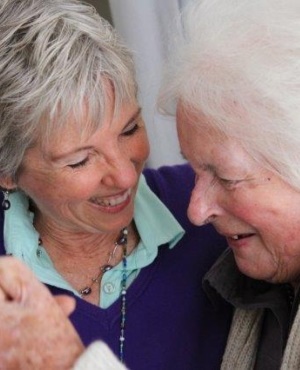
Dementia is something most of us would rather not think about . . . until it affects us directly.
Dementia describes changes to your memory, mood, behaviour and thinking abilities to such an extent that it interferes with your daily functioning.
Alice Ashwell, a Cape Town based dementia educator and coach, is passionate about the need to overcome the stigma associated with dementia.
Her mother lived with dementia for about 15 years.
This is her story.
“My mother, Elizabeth, passed away in 2016 after living with dementia for about fifteen years. Mom had always been my wise woman, so I really battled with her declining mental capacity. Over that period, what had initially felt like an unmitigated journey of loss and frustration, unexpectedly developed into one of the most precious periods in our relationship.
Although by the end of her life Mom was no longer able to speak, but dementia did little to diminish who she was in her soul. In fact, she became even more loving and expressive than when she’d been of sound mind. Even though she could no longer give advice, I continued to benefit from her wisdom by observing her adapted way of being in the world.
As Mom’s dementia progressed I embarked on my own journey, learning to accept what was. This meant accepting the fact that she wasn’t going to get better. It also meant accepting that I needed to enter her reality, rather than insisting that she conform to mine. For example, I realised that my natural but unhelpful tendency to correct Mom just upset her and undermined her confidence.
It was better for both of us if I simply slipped into her world where my identity could morph freely, providing her with whatever relationship she needed at that time – daughter, mother, sister or friend.
As Mom’s cognitive faculties declined, she became far more emotionally sensitive. I now recognise that many of the behavioural problems we think are caused by dementia, are in fact triggered by our own irritability and impatience, which they sense. So, if I wanted to spend quality time with Mom, it was up to me to create an emotional environment in which she felt safe, calm and loved.
My need to cope with Mom’s dementia is one of the factors that led me to start a daily mindfulness practice. I became more aware of my own emotional state and learnt simple techniques that enabled me to shift out of my habitual state of irritability and into a state of calm. Over time this calm practice transformed my experience of Mom’s dementia and deepened our relationship.
In her later years, as she became detached from the stays of time, Mom came to epitomise for me what it means to dwell in the present moment. Our times together became opportunities to experience the intimacy of simply being present with someone you love, without needing to talk about ‘what we had done’ or ‘what we had planned’.
The dementia journey is hugely challenging, and provokes in us a great deal of frustration, fear and dread – understandably so. But as much as dementia is described as a journey of loss, it can also become a journey of love and understanding. At times, love needs to be gritty and determined, and other times it will be sweet. At all times it must be unconditional.”




 Publications
Publications
 Partners
Partners
















